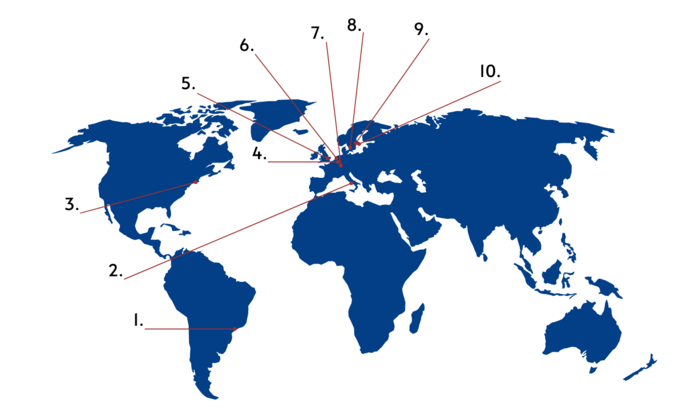Subject Area and Research Team: V. In vivo studies on mechanism of disease and therapy
Research topics
1. Nucleotides metabolism in cardiovascular diseases, neurodegenerative diseases and cancer. Role of microenvironmental factors contributing to tumorigenesis and cancer progression. Application of the mouse models of disease, e.g. lung, breast and pancreatic cancer
2. Modulation of the innate immune system in support of immunotherapy and investigation of the role of G protein-coupled receptor signaling in autoimmune diseases
3. Effect of different treatments on the functions of cardiovascular parameters using experimental disease systems and investigation of cell-penetrating peptides complexes with different drugs to improve PK/PD and decrease toxicity
4. Modification of renal hemodynamics and nephron functions in various pathophysiological conditions
5. The role of fatty acid elongation and lipid alterations in metabolic disease
6. Influence of selected stressors, metabolic and neurodegenerative disorders on the structure and function of the brain tissue
Coordinators
| Coordinator #1 | Coordinator #2 | Coordinator #3 | Coordinator #4 | |
|---|---|---|---|---|
| Name and surname |  |
 |
 |
 |
| Academic degree | Ph.D. | Ph.D. | Dr. Habil. | V.M.D. |
| Employment unit | Department of Biochemistry | Department of Biochemistry | Department of Cell Biology and Immunology | Tri-City University Animal House – Research Service Center |
| Polish Platform of Medical Research | Paulina Mierzejewska, Ph.D. | Marta Tomczyk, Ph.D. | Dr. Habil. Patrycja Koszałka | Grażyna Anna Peszyńska-Sularz, V.M.D. |
| paulina.mierzejewska@gumed.edu.pl | marta.tomczyk@gumed.edu.pl | patrycja.koszalka@gumed.edu.pl | grazyna.peszynska-sularz@gumed.edu.pl | |
| Phone number | +48 58 523 14 60 | +48 58 349 14 60 | +48 58 349 14 38 | +48 58 349 16 60 |
Research Team: V. In vivo studies on mechanism of disease and therapy
Team Members: V. In vivo studies on mechanism of disease and therapy (220 KB)Feel free to contact one of our coordinators to join our Research Team.
Key current projects
1. Energy status and adenine nucleotides metabolism in regulation of cancer progression and promotion, atherosclerosis, heart failure, Huntington’s disease
2. Application of gain-of-function variants of complement C2 protein and investigation of a universal antibody recognizing tumor cells resistant to the first-line immunotherapeutic
3. Examination of conjugates of cell-penetrating peptides with therapeutics in the treatment of diseases, e.g., cancers, Alzheimer’s, Parkinson’s, etc., and investigation of new therapeutic options for pulmonary arterial hypertension
4. Markers of glomerular and tubular dysfunctions in the early and late stages of chronic kidney disease
5. Investigation of lipids alterations in an experimental model of obesity and the role of fatty acid elongation in mice model of ELOVL1 mutation
6. Metabolic and neurodegenerative disorders as determinants of dysfunction of the brain neurovascular unit
Key grants
| Funding agency/grant number | Title of the project | Years | |
|---|---|---|---|
| 1. | NCN, OPUS 19, 2020/37/B/NZ4/00821 |
Metabolism of very-long-chain fatty acids and pathophysiological role of fatty acid elongase -1 (ELOVL1). | 2021-2023 |
| 2. | NCN, OPUS 18, 2019/35/B/NZ6/02450 |
Concept of the universal antibody targeting tumor cells resistant to first-line immunotherapeutics | 2020-2024 |
| 3. | NCN, OPUS 17, 2019/33/B/NZ4/03000 |
The EBI2 receptor/oxysterol signaling in multiple sclerosis pathophysiology, therapy, and diagnostics | 2020-2024 |
| 4. | NCN, PRELUDIUM 15, 2018/29/N/NZ4/02259 |
The role of AMP deaminase and effects of its inhibition on cardiac mitochondrial function in the experimental hypoxic and failing heart | 2019-2021 |
| 5. | NCN, OPUS 14, 2017/27/B/NZ5/02192 |
CD73 (ecto-5’-nucleotidase) function in breast cancer progression and promotion, and its assessment as a therapeutic target | 2018-2022 |
| 6. | NCN, OPUS 12, 2016/23/B/NZ4/03877 |
Adaptations of cardiac myocyte energy metabolism in atherosclerosis – implication for pathology and therapeutic strategies | 2017-2021 |
| 7. | NCN, OPUS 12, 2016/23/B/NZ5/02632 |
Involvement of P2 receptors in the pathogenesis of glomerular permeability disturbances in experimental-induced diabetes type 1 | 2017-2021 |
| 8. | NCN, PRELUDIUM 11, 2016/21/N/NZ4/03825 |
Involvement of oxidized low-density lipoprotein in the pathogenesis of. glomerular permeability disturbances in hypercholesterolemia | 2017-2021 |
| 9. | NCN, HARMONIA 8, 2016/22/M/NZ4/00678 |
Reversal of heart failure during mechanical support of left ventricular function – the role of nucleotides and energetics in cardiac cells | 2017-2022 |
| 10. | NCN, HARMONIA 7, 2015/18/M/NZ6/00334 |
Functional characteristics and therapeutic potential of gain-of-function mutations in complement C2 protein | 2016-2021 |
International cooperation
| Foreign partner (unit name) | Principal investigator(s) | Area of cooperation | |
|---|---|---|---|
| 1. | Departamento de Bioquímica, Universidade de São Paulo, São Paulo, Brazil | Talita Glaser | The role of nucleotides metabolism in myopathies related to Huntington’s disease |
| 2. | Department of Veterinary Medicine, University of Naples Federico II, Naples, Italy | Orlando Paciello | Joint funding acquisition, sharing of research tools and expertise |
| 3. | Novartis Institutes for Biomedical Research, Cambridge (Massachusetts), USA | Andreas Sailer | Expertise in GPCR research, support with research tools (e.g. receptor compounds, antibodies, cell lines, knock-out mice, tissue, etc.) |
| 4. | German Center for Neurodegenerative Disease, Bonn, Germany | Sinead O’Sullivan | Joint funding acquisition |
| 5. | Department of Life Sciences, Imperial College, London, UK | Michał Mielcarek | The role of disturbances in cardiac energy and nucleotides in the pathology of Huntington’s disease |
| 6. | Radboud University Medical Center, Nijmegen, Netherlands | Lambertus van den Heuvel | Clincal samples |
| 7. | University of Zurich, Zurich, Switzerland | Cheryl DeValliere | Joint funding acquisition, sharing of research tools and expertise |
| 8. | Department of Translational Medicine, Lund University, Lund, Sweden | Anna Blom | Biacore analysis |
| 9. | Department of Molecular Medicine and Surgery Karolinska Institutet, Södertälje, Sweden | Camilla Krizhanovskii | Sharing research tools and scientific expertise, student supervision |
| 10. | NeuroCardioMetabol group, Department of Clinical Science and Education, Karolinska Institutet, Stockholm, Sweden | Cesare Patrone | Common grants/grant application, sharing research tools and scientific expertise |

Key publications
1. Olkowicz M, Tomczyk M, Debski J, Tyrankiewicz U, Przyborowski K, Borkowski T, et al. Enhanced cardiac hypoxic injury in atherogenic dyslipidaemia results from alterations in the energy metabolism pattern. Metabolism. 2021; 114: 154400.
2. Pakiet A, Jakubiak A, Miejerzewska P, Zwara A, Liakh I, Sledzinski T, Mika A. The effect of a high-fat diet on the fatty acid composition in the hearts of mice. Nutients. 2020; 12(3): 824.
3. Urban A, Volokhina E, Felberg A, Stasiłojć G, Blom AM, Jongerius I, van den Heuvel L, Thiel M, Ołdziej S, Arjona E, de Córdoba SR, Okrój M. Gain-of-function mutation in complement C2 protein identified in a patient with aHUS. J Allergy Clin Immunol. 2020; 146: 916-919.e.11.
4. Steliga A, Kowianski P, Czuba E, Waśkow M, Moryś J, Lietzau G. Neurovascular Unit as a Source of Ischemic Stroke Biomarkers-Limitations of Experimental Studies and Perspectives for Clinical Application. Transl Stroke Res. 2020; 11(4): 553-579.
5. Rusiecka I, Ruczyński J, Kozłowska A, Backtrog E, Mucha P, Kocić I, Rekowski P. TP10-Dopamine Conjugate as a Potential Therapeutic Agent in the Treatment of Parkinson’s Disease. Bioconjug Chem. 2019; 30(3): 760-774.
6. Sass P, Sosnowski P, Podolak-Popinigis J, Górnikiewicz B, Kamińska J, Deptuła M, Nowicka E, Wardowska A, Ruczyński J, Rekowski P, Rogujski P, Filipowicz N, Mieczkowska A, Peszyńska-Sularz G, Janus Ł, Skowron P, Czupryn A, Mucha P, Piotrowski A, Rodziewicz-Motowidło S, Pikuła M, Sachadyn P. Epigenetic inhibitor zebularine activates ear pinna wound closure in the mouse. EBioMedicine. 2019; 46: 317-329.
7. Kutryb-Zajac B, Koszalka P, Mierzejewska P, Bulinska A, Zabielska MA, Brodzik K, Skrzypkowska A, Zelazek L, Pelikant-Malecka I, Slominska EM, Smolenski RT. Adenosine deaminase inhibition suppresses progression of 4T1 murine breast cancer by adenosine receptor-dependent mechanisms. J Cell Mol Med. 2018; 22(12): 5939-5954.
8. Kasztan M, Piwkowska A, Kreft E, Rogacka D, Audzeyenka I, Szczepanska-Konkel M, Jankowski M. Extracellular purines’ action on glomerular albumin permeability in isolated rat glomeruli: insights into the pathogenesis of albuminuria. Am J Physiol Renal Physiol. 2016; 311(1): F103-11.